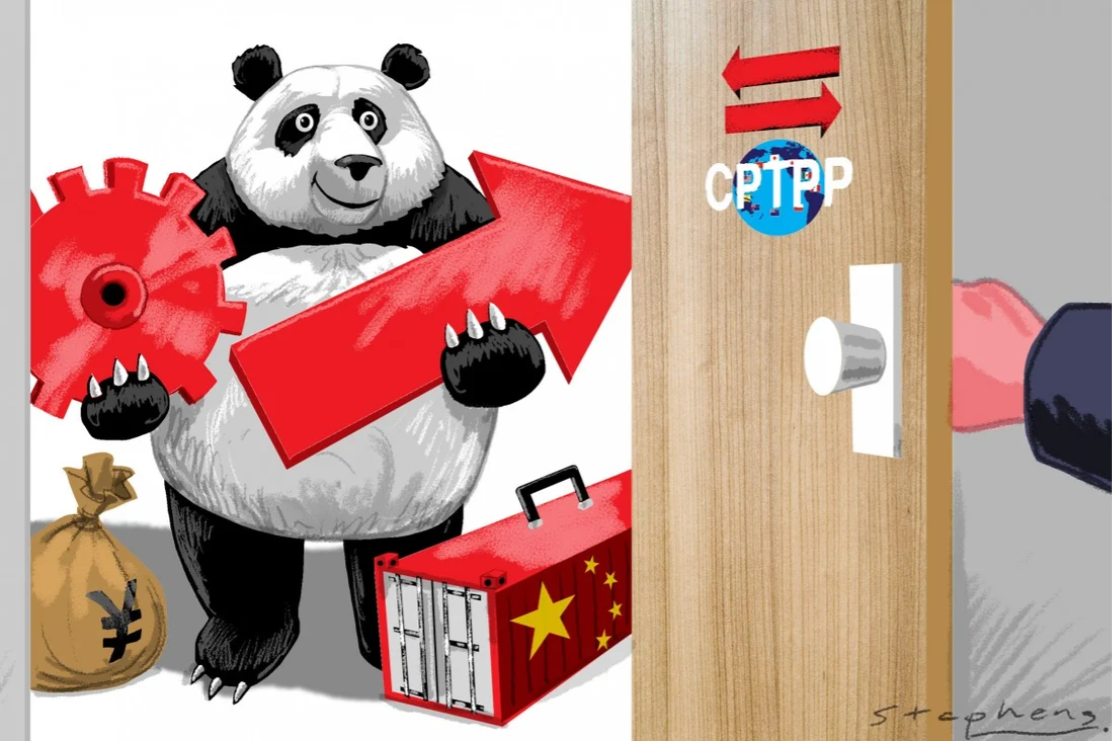Dr Zhou Mi is a senior research fellow at the Chinese Academy of International Trade and Economic Cooperation, and a China Forum expert.
Lee Jersey Wang is a China Forum associate.
China submitted its formal application this month to join the Comprehensive and Progressive Agreement for Trans-Pacific Partnership (CPTPP). During this time of turbulence in international trade, and of progress and reform in China, it serves as a strong signal that China intends to stay open internationally and improve economic standards domestically.
The trade pact is not new, of course. The US withdrawal in January 2017 of the proposed Trans-Pacific Partnership, the CPTPP’s predecessor, ended any chance of the TPP coming into effect. The remaining 11 TPP countries then made some adjustments to the original agreement and launched the pact as the CPTPP. Despite the agreement coming into effect in 2018, however, ratification by all signatories has been slow, due to concerns about potential adverse economic impacts. Chile has yet to ratify the agreement because of major domestic opposition.
The reason for such concern is partly due to the unique nature of the CPTPP, which is not simply a “normal” trade agreement whereby all parties pledge to reduce trade barriers, mainly through cutting tariffs. It also confers on all parties responsibilities to raise the standards of their economy in exchange for greater access to each other’s markets. This balance between obligation and reward affords all parties a more even playing field, at the potential expense of national sovereignty, as the CPTPP empowers the creation of ad hoc arbitration bodies and subsequent consequences for any party that violates the treaty. The CPTPP addresses areas that past treaties have mostly shied away from, including setting standards on intellectual property, labour, state-owned enterprises, ESG (environmental, social and corporate governance) and investment for member states, in exchange for obtaining “right of origin” access to each other. By harmonising the broader context within which economic activity takes places, these standards allow CPTPP countries to trade under fairer conditions, so that no one country can gain an unfair advantage by ruthlessly and unsustainably exploiting domestic factors of production.

This is why China declaring its desire to join the CPTPP is so important. While actual entry into the trade pact may be uncertain, due to the high political and economic barriers, this serves as a powerful statement both to the world and to Chinese society. To the world, China has shown that it will maintain an open attitude to further international economic cooperation.
On international trade, China has had both successes, in the signing of the Regional Comprehensive Economic Partnership, and setbacks, in the stalling of progress on the Comprehensive Agreement on Investment between China and the EU. But it will neither rest on its laurels nor be discouraged by unfavourable headwinds. It is willing to make changes, both internationally and domestically, to promote a more integrated international order that can deliver greater prosperity to all. The RCEP is a more traditional free-trade agreement, similar to the FTAs signed in the past. China has recognised that moving forwards requires greater ambition than before, that future trade deals will extend far beyond simply tariffs, and will be a broader rebalancing of how the global economy is conducted. China’s desire to join the CPTPP reflects that greater ambition.
Domestically, the government has shown that it is determined to improve the quality and standards of the Chinese economy. In the past, when poverty was rife and China’s overall economic activity and production lagged behind countries with far smaller populations, economic growth was the paramount goal. The government’s priority was to secure people’s right to put food on the table. Success in the war on poverty meant that the government could move to the next rungs on Maslow’s hierarchy of needs. From as far back as 2014, China has started to move away from a focus purely on economic growth, towards looking at other measures of prosperity and happiness. Its first major move was to declare a war on smog. This has gradually grown into a broader progressive push over the past two years to improve society for all, much as the American progressives did in the early 20th century. The most prominent examples of this include the pledge to achieve carbon neutrality by 2060, moves against monopolies, and a greater focus on the excessive pressure placed on families and students, among others.
These moves were not made out of a desire to join the CPTPP, or any other international agreement for that matter, although these would act as a further incentive. The Chinese government, like all other governments, is ultimately responsible to its people, and it will always look for the right time and right ways to improve people’s welfare. That time is clearly now. This goal will be more effectively achieved for China if it is in the CPTPP, with fair and mutual market access to 11 other countries’ economies and markets, but it will be pursued regardless.
There remain challenges for Chinese entry into the CPTPP. Chief among them are the transparency requirements, IP protection, workers’ rights, standards for state-owned enterprises, and acquiescence to some degree of external pressure. However, even on these tougher fronts for reforms, China is showing its willingness to make necessary adjustments, and not view these external requirements as unfair pressure, but instead as another opportunity to prove itself as a responsible and productive member of the international community.
China is up to the challenge. Contrary to naysayers, it remains a dynamic power that is ready to improve itself, and help construct a global system that works for the benefit of as many people as possible.
(This article was orginally published on SCMP on Sep 29, 2021.)
